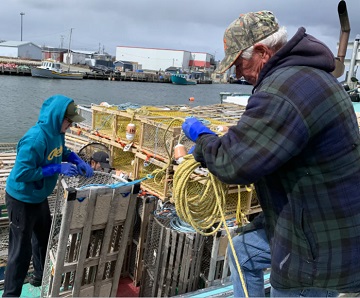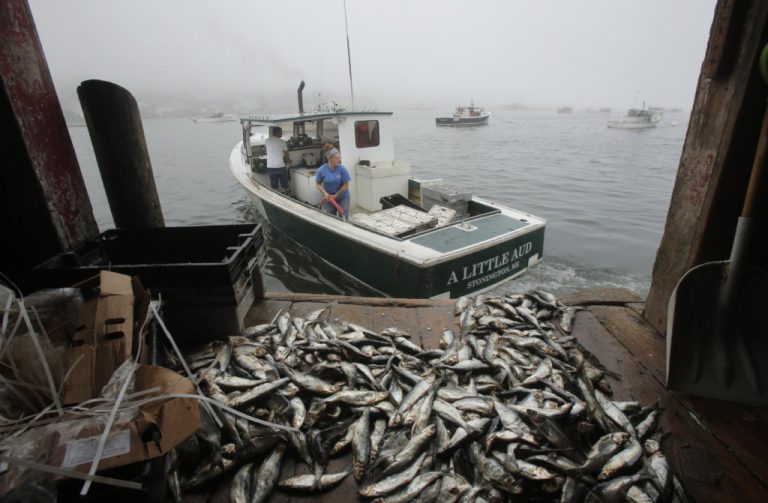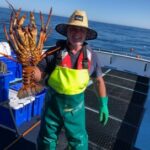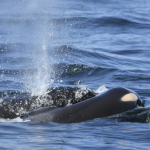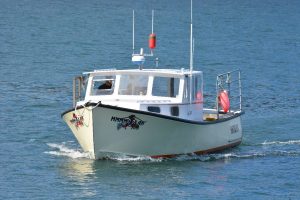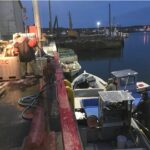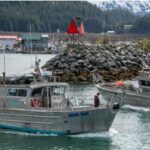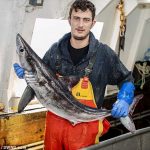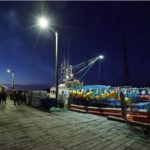Tag Archives: Cape Breton
Snow crab quotas way up for some Cape Bretoners, way down for others
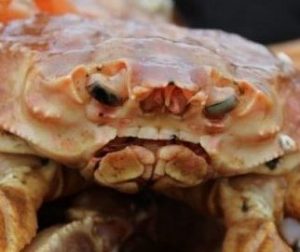 Gulf of St. Lawrence snow crab fishermen are learning who’ll be winners and losers when quotas are divided up for the 2025 season. At a meeting with Fisheries and Oceans Canada (DFO) in Moncton this week, the commercial fishermen in Area 19 (near shore in western Cape Breton) learned they’ll get a 42 per cent quota increase. That’ll offset quota cuts in the past two years that equaled about the same. The much larger Area 12 fishery, which covers the central Gulf of St. Lawrence all the way to New Brunswick, meanwhile, can expect to see an over 20 per cent cut to their quota. Demand for snow crab is high in the United States, where 85 per cent of what’s caught in the southern Gulf goes. Prices were around $4 a pound last year and it was hoped to be higher this season. But U.S. President Donald Trump’s threat of a 25 per cent tariff could hurt everyone’s bottom line. “We’re waiting on Trump, like every industry from forestry to mining,” said MacLean. more, >>CLICK TO READ<< 15:22
Gulf of St. Lawrence snow crab fishermen are learning who’ll be winners and losers when quotas are divided up for the 2025 season. At a meeting with Fisheries and Oceans Canada (DFO) in Moncton this week, the commercial fishermen in Area 19 (near shore in western Cape Breton) learned they’ll get a 42 per cent quota increase. That’ll offset quota cuts in the past two years that equaled about the same. The much larger Area 12 fishery, which covers the central Gulf of St. Lawrence all the way to New Brunswick, meanwhile, can expect to see an over 20 per cent cut to their quota. Demand for snow crab is high in the United States, where 85 per cent of what’s caught in the southern Gulf goes. Prices were around $4 a pound last year and it was hoped to be higher this season. But U.S. President Donald Trump’s threat of a 25 per cent tariff could hurt everyone’s bottom line. “We’re waiting on Trump, like every industry from forestry to mining,” said MacLean. more, >>CLICK TO READ<< 15:22
Commercial whelk fishery opens in eastern Cape Breton
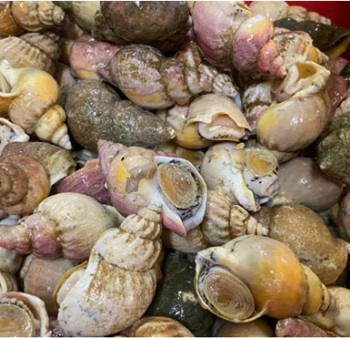 On Tuesday, an event at Louisbourg Seafoods processing plant ushered in the first commercial whelk fishery in waters along the island’s eastern coast. The Louisbourg, N.S., company began experimenting with the harvest of whelk more than a decade ago. “We have a science team and they spend all their time looking at this, and basically developed a clear understanding of what the fishery was out there and how best to manage it,” said Allan MacLean, Louisbourg Seafoods’ senior operations manager. The whelk fishery off eastern Cape Breton, in an area known as the Northwest Atlantic Fisheries Organization Area 4Vs, was previously licensed only for exploratory harvesting to determine if stocks could sustain a commercially viable operation, Fisheries and Oceans Canada said Tuesday in a news release. more, >>CLICK TO READ<< 19:46
On Tuesday, an event at Louisbourg Seafoods processing plant ushered in the first commercial whelk fishery in waters along the island’s eastern coast. The Louisbourg, N.S., company began experimenting with the harvest of whelk more than a decade ago. “We have a science team and they spend all their time looking at this, and basically developed a clear understanding of what the fishery was out there and how best to manage it,” said Allan MacLean, Louisbourg Seafoods’ senior operations manager. The whelk fishery off eastern Cape Breton, in an area known as the Northwest Atlantic Fisheries Organization Area 4Vs, was previously licensed only for exploratory harvesting to determine if stocks could sustain a commercially viable operation, Fisheries and Oceans Canada said Tuesday in a news release. more, >>CLICK TO READ<< 19:46
Mi’kmaw fishermen say they’re being threatened, prevented from selling catch in Cape Breton
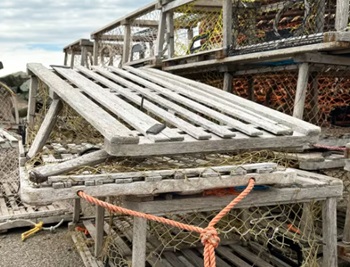 Some Mi’kmaw lobster fishermen say they’re still being prevented from earning a moderate livelihood, more than two weeks after the Department of Fisheries and Oceans began investigating allegations of trap tampering near Louisbourg, N.S. Last month, Eskasoni First Nation fisherman Charles Francis said 70 of his 178 traps were damaged. Since then, some Mi’kmaw fishermen say they have been threatened, denied fuel sales and mechanical work on their boats, and are being prevented from selling their catch by some people in or associated with the commercial fishery. “It’s pure racism,” said Michael Basque, the moderate livelihood fishery co-ordinator for Unama’ki, which is the Mi’kmaw name for Cape Breton. more, >>CLICK TO READ<< 07:50
Some Mi’kmaw lobster fishermen say they’re still being prevented from earning a moderate livelihood, more than two weeks after the Department of Fisheries and Oceans began investigating allegations of trap tampering near Louisbourg, N.S. Last month, Eskasoni First Nation fisherman Charles Francis said 70 of his 178 traps were damaged. Since then, some Mi’kmaw fishermen say they have been threatened, denied fuel sales and mechanical work on their boats, and are being prevented from selling their catch by some people in or associated with the commercial fishery. “It’s pure racism,” said Michael Basque, the moderate livelihood fishery co-ordinator for Unama’ki, which is the Mi’kmaw name for Cape Breton. more, >>CLICK TO READ<< 07:50
Lobsters prices fall. Crates of crustaceans pile up on Cape Breton
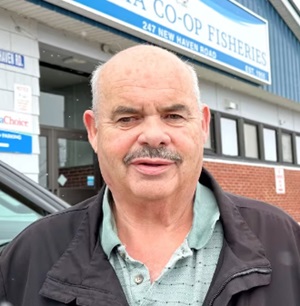 There are so many lobsters ready for processing or live sale in some eastern Cape Breton harbours that they’re being stored temporarily in large flotillas of plastic crates. Some seafood buyers have stopped buying altogether and others are implementing daily limits on the amount of lobster they will buy. Fishermen worry the oversupply is driving down the price and while some in the industry say it could be a sign of longer term problems, one buyer says the backlog is evidence that lobster conservation efforts are working, and it will ease off in a couple of weeks. “Our processing facility is maximized daily, seven days a week and our holding facility is pretty darn full as of Saturday night,” said Osborne Burke, general manager of Victoria Co-operative Fisheries in New Haven, northern Cape Breton. more, >>CLICK TO READ<< 11:41
There are so many lobsters ready for processing or live sale in some eastern Cape Breton harbours that they’re being stored temporarily in large flotillas of plastic crates. Some seafood buyers have stopped buying altogether and others are implementing daily limits on the amount of lobster they will buy. Fishermen worry the oversupply is driving down the price and while some in the industry say it could be a sign of longer term problems, one buyer says the backlog is evidence that lobster conservation efforts are working, and it will ease off in a couple of weeks. “Our processing facility is maximized daily, seven days a week and our holding facility is pretty darn full as of Saturday night,” said Osborne Burke, general manager of Victoria Co-operative Fisheries in New Haven, northern Cape Breton. more, >>CLICK TO READ<< 11:41
Lobster harvesters in Atlantic Canada to vote on increasing minimum legal size this year
 At stake is maintaining access to the United States market. “It will be an individual vote. That’s a big decision that every single enterprise and owner has to look at from their own business,” said Heather Mulock, executive director of the Coldwater Lobster Association, which represents fishermen in lobster fishing area 34 (LFA 34). In late May or June, the 979 licence holders in the area will be asked to vote on whether to match increases in allowable U.S. catch measurements that will come into effect Jan. 1, 2025, and again in 2027. Live Canadian lobster that fall under the new limits would not be allowed into the U.S. That includes bonded shipments of lobster under the new minimum in the U.S., according to an information package sent to fishermen in southwestern Nova Scotia. That could block trucking of “undersized” Canadian lobster across the border for flights to Asia from airports in Boston or New York. more, >>click to read<< 08: 57
At stake is maintaining access to the United States market. “It will be an individual vote. That’s a big decision that every single enterprise and owner has to look at from their own business,” said Heather Mulock, executive director of the Coldwater Lobster Association, which represents fishermen in lobster fishing area 34 (LFA 34). In late May or June, the 979 licence holders in the area will be asked to vote on whether to match increases in allowable U.S. catch measurements that will come into effect Jan. 1, 2025, and again in 2027. Live Canadian lobster that fall under the new limits would not be allowed into the U.S. That includes bonded shipments of lobster under the new minimum in the U.S., according to an information package sent to fishermen in southwestern Nova Scotia. That could block trucking of “undersized” Canadian lobster across the border for flights to Asia from airports in Boston or New York. more, >>click to read<< 08: 57
Cape Breton boatbuilders help DFO to face commercial, climate change challenges
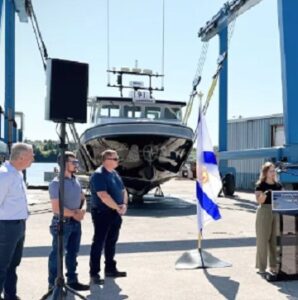 The federal Department of Fisheries and Oceans is having four new patrol boats built in rural Cape Breton to address some of the challenges faced by fisheries enforcement officers. The new boats are larger than the existing ones to better deal with the effects of climate change, larger commercial vessels and heavier fishing gear. Once completed, the boats will be used in the Atlantic region. “As we’ve seen in the last couple of years, climate change is a huge thing … and adverse weather conditions are getting more and more frequent and our officers just don’t take a day off because it’s really bad weather-wise,” said Scott Phillips, DFO’s eastern Nova Scotia area chief of conservation and protection. Photos, >click to read< 17:27
The federal Department of Fisheries and Oceans is having four new patrol boats built in rural Cape Breton to address some of the challenges faced by fisheries enforcement officers. The new boats are larger than the existing ones to better deal with the effects of climate change, larger commercial vessels and heavier fishing gear. Once completed, the boats will be used in the Atlantic region. “As we’ve seen in the last couple of years, climate change is a huge thing … and adverse weather conditions are getting more and more frequent and our officers just don’t take a day off because it’s really bad weather-wise,” said Scott Phillips, DFO’s eastern Nova Scotia area chief of conservation and protection. Photos, >click to read< 17:27
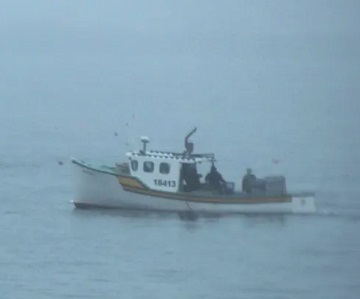
Despite whale detection, western Cape Breton crab fishers will complete quota in days
Part of Snow Crab Area 19, Cape Breton’s largest crab fishing zone in the Gulf of St. Lawrence, has been restricted for at least 15 days by the Department of Fisheries and Oceans (DFO). That comes after a North Atlantic right whale was detected last week by an acoustic sensor near Pleasant Bay. As a result, the Department of Fisheries and Oceans (DFO) has ordered fishers with traps in Area 19 to move them to the far north or south parts of the zone by Monday evening. While it is extra work to move the traps, most fishers anticipate almost no impact on the overall catch. “Catches are good, so a lot of the boats will be finished up in the next couple of days,” said Sandy Doucette, who fishes out of Cheticamp. >click to read< 20:00
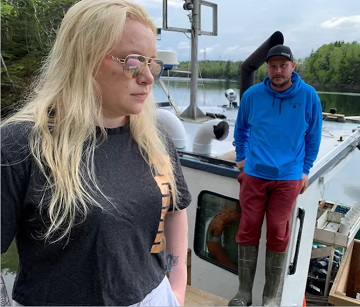
‘They look at me as an outsider’: Cape Breton fisherman says boat burned, gear vandalized
Adam Morrison said he bought the licence for more than $800,000 and had fished lobster previously in a nearby community, Big Bras d’Or, for an employer. This was a chance to have his own boat, literally in his backyard. “I put my house on the line for this lobster licence,” Morrison told the Cape Breton Post. “They don’t want to let you make a go of it … They refuse to believe I went out on my own and got this.” In early May, Morrison, an early riser due to his profession, managed to stave off disaster when he noticed a fire onboard his boat, docked at the wharf on the rear of the property. Photos, >click to read and comment< 11:06
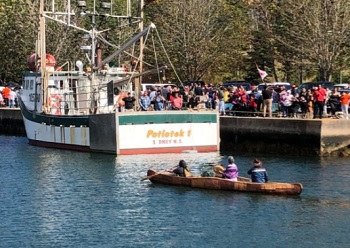
Bigger Mi’kmaw lobster fishery possible because DFO redistributed unused licences
Mike Leonard, director of Indigenous fisheries management for DFO’s Maritimes region, said the federal department has bought back lobster licences over the years as commercial fishers voluntarily relinquished them, creating a bank of licences that Indigenous communities can access. That process has allowed Eskasoni to join two other First Nations in the moderate livelihood fishery during this spring’s season without affecting the health of the lobster stocks, he said. “In the first year, in 2021, we worked with Potlotek First Nation and then last year We’koqma’q First Nation joined as well and this year it’s become an Unama’ki approach, so across the Unama’ki traditional territory, which aligns with Cape Breton,” Leonard said. >click to read< 08:55
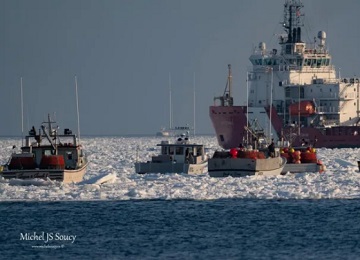
Cape Breton fishermen say ice was a problem because DFO didn’t follow its own policy
Some Cape Breton fishermen say if the Department of Fisheries and Oceans hadn’t opened the Gulf of St. Lawrence snow crab season too early, icebreakers would not have been needed to get boats in and out of Cheticamp harbour. Andrew Bourgeois, president of the Gulf of Nova Scotia Fishermen’s Coalition and a director of the Gulf fleet planning board, said DFO officials usually agree to wait until all the coasts are ice-free, but not this year. “I think if DFO would have followed their protocol, I don’t think there would have been an issue with the ice,” he said. “The protocol says that if there was ice at 20 fathoms or deeper that it shouldn’t open, it wouldn’t open. And they opened it anyways.” >click to read< 13:11
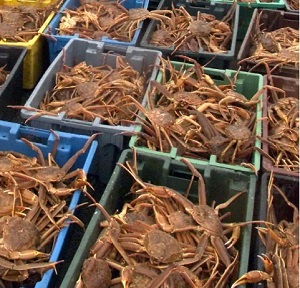
Low prices could force out some snow crab harvesters
The snow crab industry in Cape Breton is in a world of trouble this year and a price of $2.25 per pound at the wharf may not be enough for some harvesters to continue. “You have the U.S. market with bank failures and they are close to a recession,” said Osborne Burke, general manager of Victoria Cooperative Fishery Ltd., located in Neils Harbour. Osborne says it’s been 15 years since the at-wharf price was that low. Factor in the economy issues and very high fuel prices and the number crunching simply isn’t working in harvesters favour. >click to read< 16:09

Fisherman sentenced for ‘blatant and overt’ interference in Membertou lobster fishery
A Cape Breton fisherman has been fined $6,200 and ordered off the water for six months for cutting lobster traps fished by the Membertou band and obstructing fishery officers. The sentence was handed down in a Sydney, N.S., courtroom Wednesday after Bernard Douglas MacIntyre pleaded guilty on two charges. Two other counts were dropped. MacIntyre and others on his boat, Kelsey & Mitchell II, were seen cutting traps in Sydney Harbour on the night of Dec. 3, 2020. The only lawful lobster fishery underway in the area was for food, social and ceremonial licence holders. Members of Membertou First Nation were fishing from the Sydport wharf. >click to read< 14:56
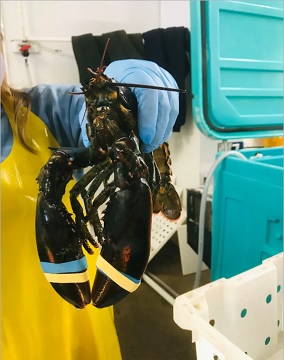
How do you show a lobster some love? A Cape Breton researcher has plenty of ideas
Michelle Theriault, a marine biologist at Université Sainte-Anne, tells her students to heap loving care on lobsters destined to markets in Auckland and Athabasca – and everywhere in between. So, how do you dote on lobsters? I dropped in on one of Theriault’s Zoom classes for lobster exporters to get some answers to that question. And while she was narrow-casting her class from the University’s Marine Research Centre at Petit-de-Grat, Cape Breton, lobster fishers were headed to sea to dump their traps on the opening day of the winter season south of Halifax. >click to read< 16:22
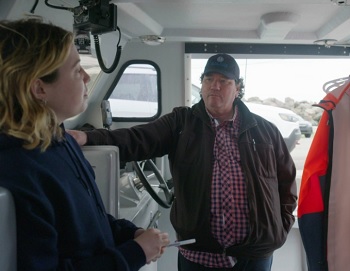
Mi’kmaq First Nation, environmental group work on creating electric lobster boat
An environmental charity and the Membertou First Nation in Cape Breton are partnering to create electric lobster boats on the East Coast, saying it’s the way of the future if Canada is to meet its zero-emission targets. Hubert Nicholas, the director of fisheries at Membertou, said in an interview the new boats will likely be costlier than diesel-powered vessels at first, but he said it’s expected there will be savings in maintenance and fuel costs. Nicholas estimated the cost of lobster boats is about $600,000 to $700,000, adding that an electrical boat would have higher, yet-to-be-determined costs for its engine and other components.>click to read< 13:11

We’koqma’q gets federal approval for moderate livelihood fishery
We’koqma’q First Nation in Cape Breton reached an understanding with the Department of Fisheries and Oceans this week. Certain harvesters can now fish lobster and sell the harvest during the established 2022 commercial seasons in Lobster Fishing Areas 27 and 31A, which run until mid-July and the the end of June, respectively. “Our harvesters continued to voice how they wanted to be able to exercise their Treaty Rights safely and they are excited to be able to provide for their families and our community through exercising their inherent rights,” said We’koqma’q Chief Annie Bernard-Daisley in a release Friday. Both fishing areas are off the Cape Breton coast. There will be a limit of 210 traps per fishing area, according to a DFO release. > click to read < 14:18
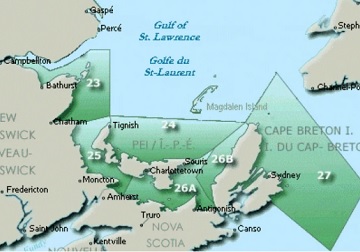
Lobster fishing season in the southern Gulf of St. Lawrence will open on Tuesday
The Department of Fisheries and Oceans announced on Saturday that lobster fishing areas 23, 24, 26A and 26B South will open on May 3 at 6 a.m. That includes areas along the northeastern coast of New Brunswick, the north shore of P.E.I., the western coast of Cape Breton, and part of the Northumberland Strait. The season was supposed to start on Saturday, but earlier this week the DFO postponed the opening due to the weather and the need for dredging at many harbours. >click to read< 19:40
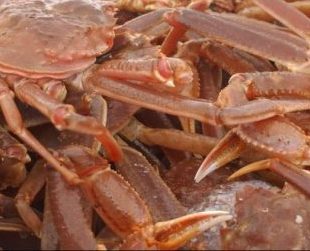
Political pressure for an early opening of the Gulf crab fishery
Quebec urges Ottawa to authorize the opening of the snow crab fishing season as soon as possible in the southern Gulf of St. Lawrence, in which crabbers from the Magdalen Islands, Gaspé and New Brunswick participate. In a letter sent on March 28 to his federal counterpart Joyce Murray, a copy of which was obtained by the QMI Agency, the Quebec minister responsible for fisheries, André Lamontagne, points out that the early opening of the snow crab fishery in the Gulf is, so far, “the most effective adaptation measure that reconciles the protection of Right whales and fishing activities”. >click to read< 10:17
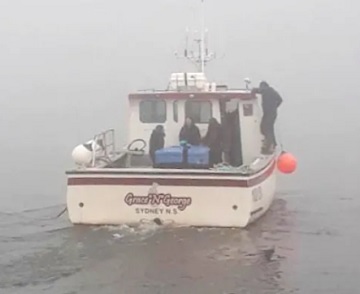
A fishing boat ferries health-care workers to Neils Harbour, Nova Scotia
The fishing community has stepped up to help deliver health-care workers to the hospital in northern Cape Breton after a storm limited access by leaving washouts on a section of the Cabot Trail. The weather has settled down and, on Friday morning, a fishing boat was able to shuttle people from the community of Ingonish to Buchanan Memorial Hospital in Neils Harbour. The Grace ‘n’ George, owned by Tommy Simms and captained by Adam Sams, left Ingonish in the fog and delivered four hospital workers to Neils Harbour a little over an hour later. >click to read< 07:42 More stories, >click to read<
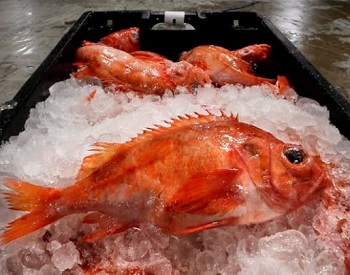
Redfish return sparks Atlantic race to cash in on reopening of commercial fishery
The centre of attention is a large section of the gulf known as Unit 1, stretching from the western coast of Newfoundland across to Quebec’s Gaspé Peninsula and down toward the northern tip of Cape Breton. A federal Fisheries Department moratorium on commercial fishing of redfish was imposed in the area in 1995 and has remained in place ever since. But from 2011 to 2013, research showed that three robust redfish cohorts had propelled growth in the overall stock. “There’s probably more redfish in the Gulf of St. Lawrence now than we’ve ever seen in our recorded history,” >click to read< 07:19
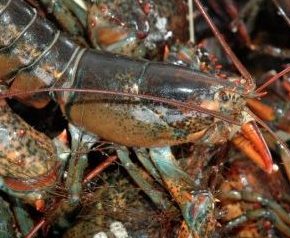
DFO seized and released hundreds of short lobster from a First Nations vessel in Cape Breton
DFO said enforcement officers inspected a vessel Tuesday night in St. Peters canal operating under a communal food, social and ceremonial licence. The lobsters were released that night. Noel d’Entremont, acting director of conservation and protection in the Maritimes region, said no charges have been laid, but an investigation is continuing. A portion of the incident was captured on video and posted to social media showing lobsters being tossed back in the water by DFO officers. The FSC licence being fished was for a Cape Breton band, which DFO declined to identify. >click to read< 17:07
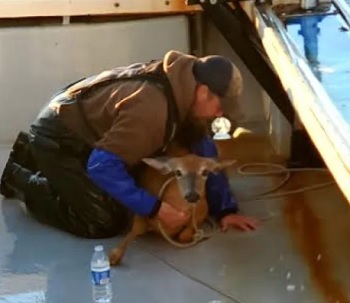
Lobster fishermen land a deer!
Two brothers lobster fishing off the coast of Antigonish, N.S., on Thursday morning hauled up an unusual catch. Justin and Luc Boudreau first noticed the deer’s head bobbing above the waves while they were fishing near Jimtown Beach. The animal looked to be headed for Cape Breton but had a long way to go. They hoisted the deer aboard. But the rescue wasn’t over. Once the deer caught its breath, it headed back overboard and into the water. >photos, click to read< Listen to the audio report with Justin Boudreau! 14:58

Potlotek First Nation seeks injunction against DFO over self-regulated fishery
A number of First Nations communities in the province, including Potlotek, launched their own self-regulated lobster fisheries last year to mark the 21st anniversary of the historic Supreme Court of Canada decision that affirmed Mi’kmaw rights to fish for a moderate livelihood. Many commercial fishermen have opposed the fisheries operating outside commercial seasons. In March, federal Fisheries Minister Bernadette Jordan said Ottawa will not licence any treaty-based fishery in Atlantic Canada unless it operates within the commercial season. >click to read< 10:15

Mi’kmaq community angered at alleged government seizure of lobster traps
Federal fisheries officers seized 37 lobster traps that were set today by an Indigenous harvester. The Potlotek First Nation, located about 75 kilometres south of Sydney, N.S., issued a news release indicating the community had authorized the traps as part of its livelihood fishery.,, Earlier this year, federal Fisheries Minister Bernadette Jordan had said if bands haven’t negotiated agreements with Ottawa and received federal licences for moderate livelihood fisheries, then the government would enforce regulations. >click to read< 19:14

Snow crab market heats up with Record-Breaking Prices in northern Cape Breton
Soaring demand from the U.S. has resulted in snow crab coming in at over $8 a pound. The price was closer to $4.25 this time last year. Dave Donovan fishes out of Neils Harbour on board the Krista & Megan. “Eight dollars is a big bonus,” he said. “I guess it’s the best price I’ve ever seen since I’ve been in the fishery.” Donovan said the hot market this year is welcomed by all on the wharf, and in the processing plant. The high price is a surprise to Osborne Burke, “We didn’t anticipate this,” >click to read< 14:14

Mi’kmaw community requested a crab season opener delay from DFO prior to boat sinking
The fisheries manager for Elsipogtog First Nation in New Brunswick says the community asked the Department of Fisheries and Oceans to delay the opening of the crab season days before a boat capsized off Cape Breton killing two crew members. According to Dawn Levi, the season started too early and a request was made to delay it. “We had a call last Thursday, on the call were industry representatives including DFO, I requested a delay in the season until it was safe for all our boats to be out there,” According to Levi, DFO said the season was starting because of “protocol.”. >click to read< 12:47

Some question if early crab season is to blame for FV Tyhawk tragedy
Concerns are being raised about what an early snow crab fishing season could mean for smaller vessels after a boat capsized on Saturday off the coast of Cape Breton, N.S. The Tyhawk belongs to the Elsipogtog First Nation in New Brunswick. Four of its crew members were rescued from the water but one, identified by community members as Seth Monahan, died. Captain Craig Sock is still missing after bad weather halted the search on Sunday, he is also presumed dead. “The government decided in their infinite wisdom that in order to save the whales and interaction with them with the fishing gear and that, that they would go early,” said Jody Pratt, harbour master with the Richibucto port authority. >click to read< 19:19
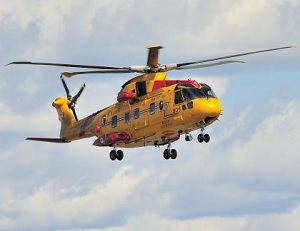
Search suspended for missing fisherman off coast of Nova Scotia
The search for a missing fisher who had been aboard a boat that capsized and sank off the west coast of Cape Breton was suspended indefinitely on Sunday night, hours after a First Nation reported that two of the vessel’s crew members had died. The decision to suspend the operation was made “based on the results of the search over the last 25 hours,” a tweet from the Halifax Joint Rescue Co-ordination Centre reads. >click to read< 07:50
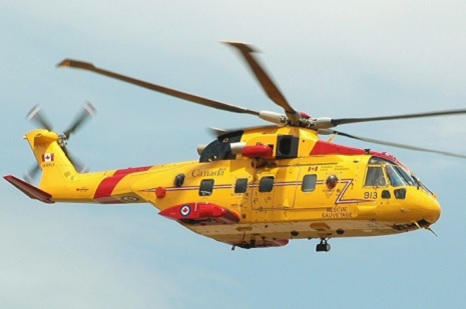
1 dead, another presumed dead after fishing boat capsizes off Cape Breton
Four crew members from the Tyhawk fishing vessel were rescued from the water Saturday evening and taken to hospital. But one, identified by community members as Seth Monahan, died. The vessel’s captain, Craig Sock, is missing and presumed dead after an unsuccessful overnight search.  The Tyhawk belongs to the Elsipogtog First Nation in New Brunswick, according to band councillor Ruth Levi. She said Monahan was originally from nearby Metepenagiag, N.B., and had been living in Elsipogtog for many years. He had two young children, she said. Levi described Sock as a “gentle soul” who loved hockey. He was known as “Jumbo” to his friends. >click to read< 20:42
The Tyhawk belongs to the Elsipogtog First Nation in New Brunswick, according to band councillor Ruth Levi. She said Monahan was originally from nearby Metepenagiag, N.B., and had been living in Elsipogtog for many years. He had two young children, she said. Levi described Sock as a “gentle soul” who loved hockey. He was known as “Jumbo” to his friends. >click to read< 20:42






 Fisheries and Oceans Canada (DFO) is claiming that it has the authority to enforce fisheries laws on two Nova Scotia First Nations, and that it can and will send officers into First Nations to enforce its regulations. In a March 18 letter to Sipekne’katik Chief Michelle Glasgow, DFO’s Maritimes region director general Doug Wentzell refuted claims that a series of court rulings deprived his department of authority to manage First Nations fishers.“The courts have repeatedly upheld the Crown’s role in regulating the fishery, as well as the use of licensing as part of fisheries management, even when regulating the exercise of Aboriginal or Treaty rights,” reads Wentzell’s letter, obtained by The Chronicle Herald.
Fisheries and Oceans Canada (DFO) is claiming that it has the authority to enforce fisheries laws on two Nova Scotia First Nations, and that it can and will send officers into First Nations to enforce its regulations. In a March 18 letter to Sipekne’katik Chief Michelle Glasgow, DFO’s Maritimes region director general Doug Wentzell refuted claims that a series of court rulings deprived his department of authority to manage First Nations fishers.“The courts have repeatedly upheld the Crown’s role in regulating the fishery, as well as the use of licensing as part of fisheries management, even when regulating the exercise of Aboriginal or Treaty rights,” reads Wentzell’s letter, obtained by The Chronicle Herald. 